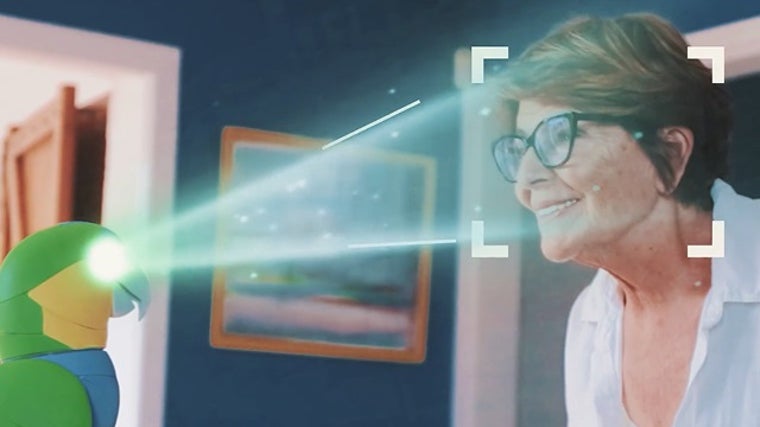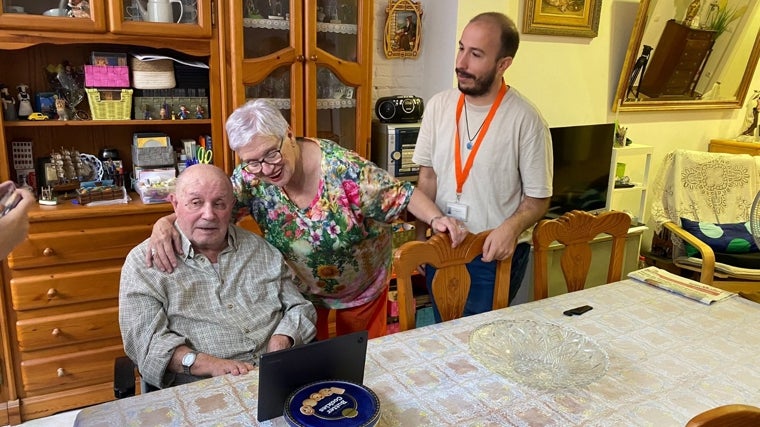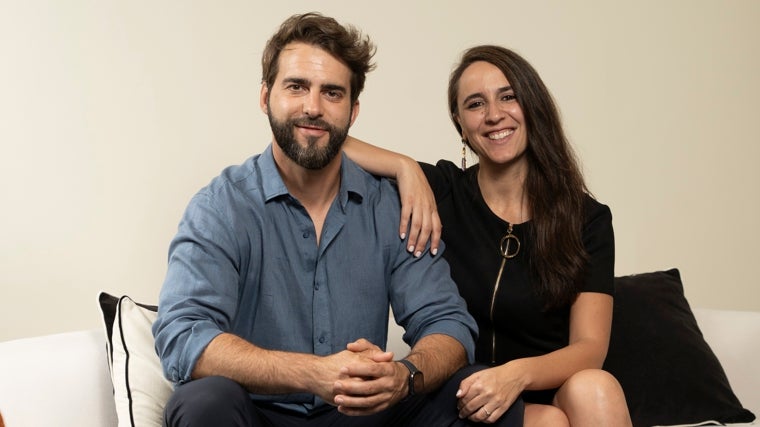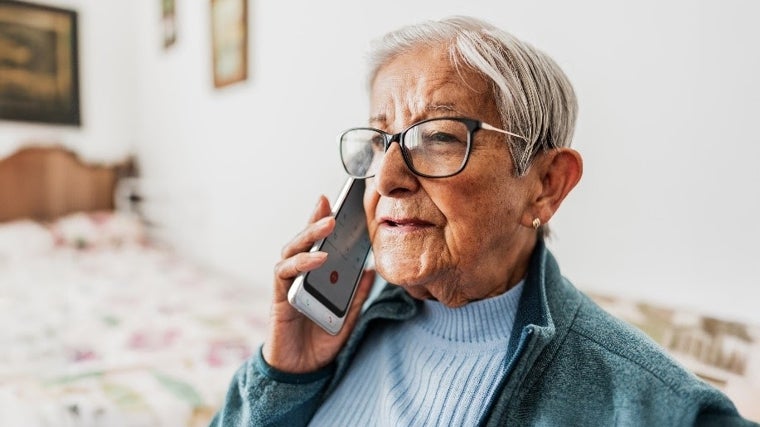AI transforms home care for the elderly

Spain is aging at an accelerated rate and needs the support of technology to address it. The proportion of people aged 65 and over has increased from 14.6% of the population in 1994 to 20.4% three decades later, and the majority desire of these people is to remain at home rather than move into a nursing home or with relatives, a phenomenon that redefines care policies. For those whose health allows them to stay at home, innovative solutions are needed to provide them with autonomy in their daily lives, a challenge in which artificial intelligence emerges as an ally.
The use cases are very varied, from voice assistants that facilitate video calls and online medical appointment booking to systems that remind users to take their medication, record their daily activity to identify unusual patterns that alert their loved ones, offer cognitive training to keep their minds sharp... the common denominator is that they seek to promote the well-being of seniors within their homes.
An added peace of mind that is appreciated by both users and their immediate family. Javier Martínez Peromingo, Secretary General of the Spanish Society of Geriatrics and Gerontology (SEGG) and Head of the Geriatrics Service at the Jiménez Díaz Foundation, explains that in addition to wearables , there are devices that belong to the Internet of Things, such as mats capable of detecting a fall in the kitchen and instantly alerting family members, which "have demonstrably reduced response time and the rate of hospitalizations related to falls in recent studies."
Security isn't the only advance. New-generation conversational assistants chat, tell jokes, and suggest breathing exercises when they sense a certain amount of discouragement. "Several state programs in the United States have documented a reduction of up to 95% in self-reported loneliness among users of these devices. In Spain, experiences like those of the Red Cross with Alexa in the Community of Madrid show that these devices are universally useful for older adults and bridge the digital divide," he says.
For families and caregivers, the impact is equally tangible. "In several countries (especially the US) , telemonitoring platforms are becoming commonplace, sending vital signs, sleep patterns, and cardiometabolic risk alerts to an app that allows this data to be shared with community nurses. In Spain, some communities are already piloting these devices," she notes. In a recent review of these devices, she specifies, "it was observed how they can reduce readmissions and unnecessary visits, while also reducing the emotional burden on informal caregivers."
Advantages that have sparked business appetite for this niche business. "The global market for AI solutions for elder care will reach $1.414 billion this year and exceed $2.200 billion by 2030, with annual growth close to 10%, and in many countries, such as Spain, it will become a major economic driver . This flow of investment is already financing public telecare projects in several Spanish autonomous communities," explains Martínez Peromingo, who emphasizes that if the money comes in, innovation becomes democratized and doesn't end up in the pockets of those who can afford a robot.
The AI craze should never translate into the dehumanization of a field that requires personal contact. "If we turn home care into an algorithmic 'call center,' we will have failed. The antidote is the ' meaningful human oversight ' required by European regulations , which implies that any automated decision must be able to be reviewed, corrected, or overturned by a professional," he adds. Furthermore, he argues that quality indicators should measure not only biomedical parameters, but also the frequency of in-person visits and the senior's level of emotional satisfaction. "Major problems such as unwanted loneliness," he warns, "will worsen if technology doesn't bring us closer together and instead separates us."
Pablo Mariñosa, founder of Onorato AI , an intelligent parrot that encourages independence in the elderly, shares this point: "Technology provides information that helps us understand what is happening and improves decision-making, but it does not relieve people of their responsibility."
Their project is based on an AI-powered pet with various features: immediate alerts for falls at home, tracking and reporting of abnormal behavior , notifications of important events such as meals or birthdays, body temperature monitoring, and asking questions to keep the mind active.
 Onorato scans the face, voice and body to know the emotional state
Onorato scans the face, voice and body to know the emotional state
"My obsession is emotional technology," confesses the creator. And it's based on four pillars. Personalization is one of them. The user and/or their family fills out a personality and interests questionnaire before receiving this peculiar companion. "For three months, we give it specific training based on the answers so that when it arrives at the person's home, it knows them and adapts to them," he comments. The entrepreneur also took great care with the parrot's exterior design so that "it makes you want to hug it."
Another differentiating factor is its ability to detect its owner's emotional state. "It has two cameras in its eyes with computer vision that, by scanning the face, voice, and body, interpret whether the person is happy, sad, or somewhere in between, and adapt its way of interacting accordingly," he says. With the support of the Barcelona Institute of Advanced Neuroscience, Mariñosa will develop a neuroscience layer over the next year to determine whether the person is suffering from anxiety, depression, or fear, and thus be able to reverse it.
In the words of the initiative's promoter, it acts as a "guardian angel" for the user, while the family accesses key parameters about their loved one through the app to act accordingly.
The initiative has been selected as the winner of the 9th Humanitarian Technology Awards, held annually by the Red Cross. So far, 30 of the 100 available units have been pre-ordered, at a price of €900 (delivery starting in December), half of what it will cost in 2026, the official launch date. "We are in talks with insurance companies, banks, and mobile operators to incorporate it into their catalogs, and also with autonomous communities to include it in the Dependency Law with European funds and thus bring it to the homes of the elderly," he emphasizes.
Specifically, the Next Generation funds have financed the Atenea project with €2.3 million, managed by the Department of Social Rights and Inclusion of the Generalitat of Catalonia. This project is promoted by the startup Momentum Analytics in collaboration with the ABD Group - Association of Well-being and Development, and has completed its pilot test in 500 homes in more than 20 Catalan municipalities. This artificial intelligence works through a tablet without buttons or touch screens , communicating exclusively by voice, and helps the user with their basic routines.
Classics like video calls or medication reminders are complemented by more engaging tasks. For example, making an appointment online avoids traveling to the health center, but the process can be difficult. Atenea connects with La Meva Salut, the personal digital space of the Catalan Health System, checks the doctor's availability, reserves the slot indicated by the user, and creates a reminder.
Albert Isern, CEO of Momentum Analytics, explains another service provided by the tool: "From 012, the Generalitat's information line, they told us they received many calls from elderly citizens asking about public transport routes. Atenea informs them by voice and shows them the itinerary on the screen." Furthermore, to promote leisure time outside the home , the tablet has a sort of carousel displaying city events. "City councils are proud that this agenda is published on their website, but seniors don't access it," they warn.
 Roc Corrales (along with his wife and Andreu Egea, social worker at ABD) was one of the 500 users of the Atenea pilot test.
Roc Corrales (along with his wife and Andreu Egea, social worker at ABD) was one of the 500 users of the Atenea pilot test.
The company is already working to expand Atena's uses to enable voice shopping (it is conducting a pilot with Sorli Discount) or access on-demand television from online platforms, for which it has initiated talks with 3Cat.
The firm is also immersed in the use of AI in the form of smartwatches. When the sensors detect a fall, Athena asks the user if they are okay. If the answer is yes, it sends an SMS alert to the contact person, and if there is no response, it calls emergency services or telecare, recording the incident, the person's details, and their location. "The goal is to extend the stay of older people in their homes , so that they don't necessarily have to move to a nursing home just because they reach a certain age. With the aging population, needs grow exponentially, but resources do not, so we have to apply efficiency, and AI helps us with this," he summarizes.
Claudia Gómez's commitment to enabling people to live at home as long as possible with the best quality of life is the seed of ClaraCare+ and Senniors , the former focusing on home hospitalization and the latter on social and healthcare services. "We combine the world of healthcare and human-delivered care with technology, including AI," she says.
ClaraCare+ offers a real-time remote monitoring platform connected to medical devices (blood pressure monitors, glucometers, pulse oximeters, etc.) that, thanks to AI, automatically alerts of anomalies, reducing response times and hospital readmissions. According to Gómez, this technology also makes it possible to establish correlations between different patient conditions, helping them discover patterns. It also helps optimize the routes of professionals who travel to homes: "This has a direct impact on how we provide the service because we make it more efficient and affordable."
 Claudia Gómez and José De Diego, co-founders of ClaraCare+ and Senniors
Claudia Gómez and José De Diego, co-founders of ClaraCare+ and Senniors
For its part, at Senniors, the starting point is a biopsychosocial assessment of the person to understand their cognitive, physical, and emotional state. "The data input is provided by healthcare professionals, and then our AI tool, called Florence , generates a care plan. It's always reviewed by a human, who makes adjustments if deemed appropriate. "Manually, it takes hours, and this way, it's just a click," Gómez points out.
The intervention program is dynamic, meaning it adapts to the user's reality at all times. And it's AI, based on the data provided by live professionals and measurements from medical devices, that's responsible for updating this plan. " AI supports our professionals; nothing that has a direct impact on the patient is left solely in their hands," explains the company's CEO. The goal is to build a care model that combines the best of both worlds.
Last year, the Spanish brand SPC, specializing in basic mobile phones, launched SPC Care , the first app on the market designed to remotely manage non-smart devices. "It was created with the clear objective of making it easier for people less familiar with them and providing peace of mind to their families by offering them a solution to remotely configure their elders' devices," explains Verónica Catediano, PR Manager at SPC. This way, they can manage basic parameters such as sound settings (tone and volume), call settings, screen brightness, font size, notifications, hands-free calling, alarms, and more.
In addition to all these options, caregivers will receive notifications about the senior's phone usage and activity to detect unusual activity and security alerts when the senior's device has missed calls, low battery, or has not been used for a long time.
 The Spanish brand SPC, specialized in basic mobile phones, launched SPC Care last year, the first application on the market designed to remotely manage your non-smart devices.
The Spanish brand SPC, specialized in basic mobile phones, launched SPC Care last year, the first application on the market designed to remotely manage your non-smart devices.
This year, at MWC 2025, they presented the second phase of the project they are already developing in their Vitoria offices: the new feature called Personal Health Assistant, in which artificial intelligence comes into play, as it uses TTS (Text-to-Speech) technology , based on advanced AI and natural language processing techniques.
"This process will transform medication reminders written by caregivers in their SPC Care app into understandable and natural voice messages," Catediano explains. This feature, which will be available in SPC Care in the coming months, will allow the reminder to be received in the form of a phone call, with clear voiceover tailored to the senior user. "Instead of relying on a notification that might go unnoticed," he explains, "the phone rings like a normal call, and a voice reminds you that it's time to take your medication."
ABC.es





